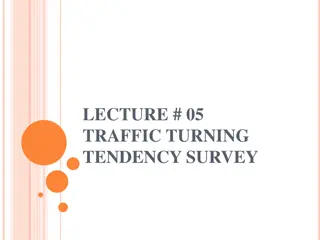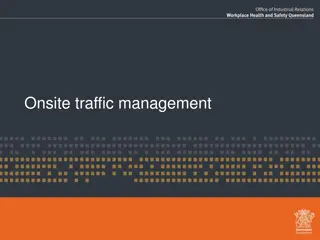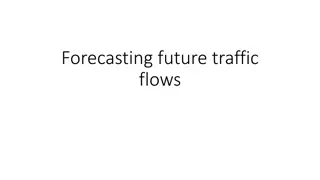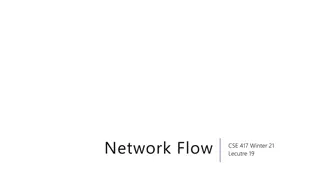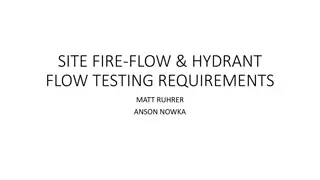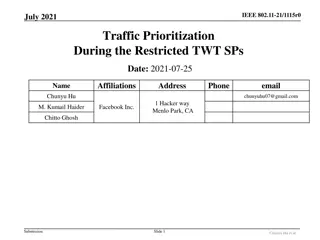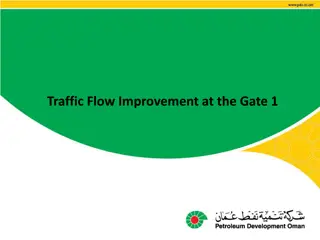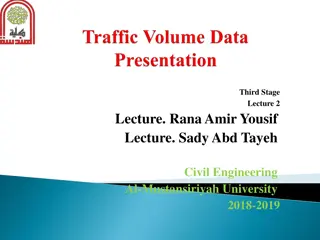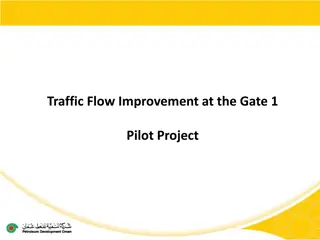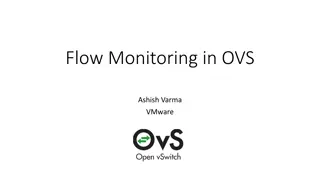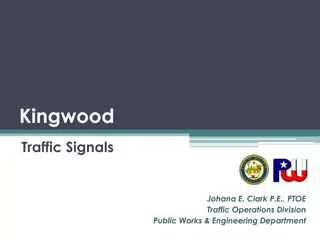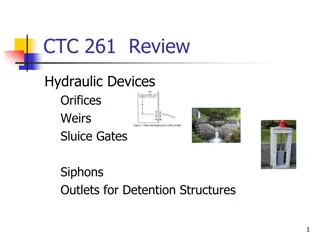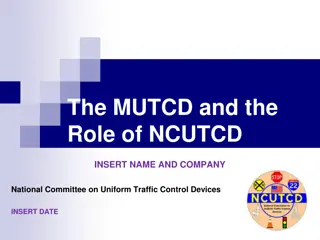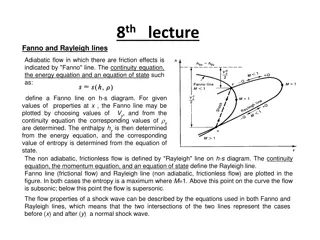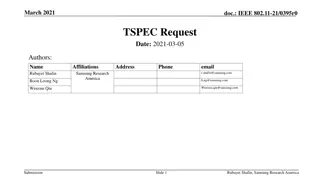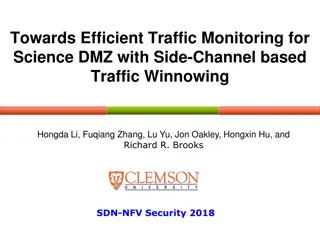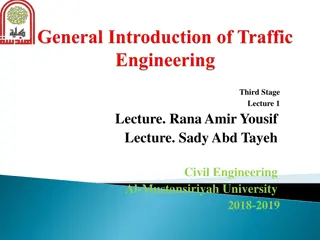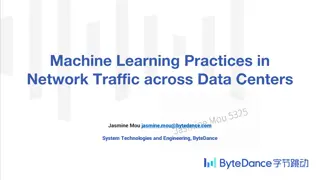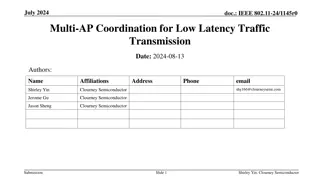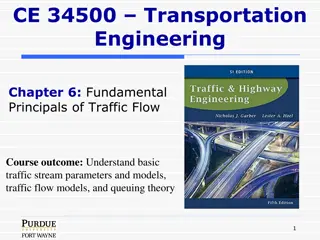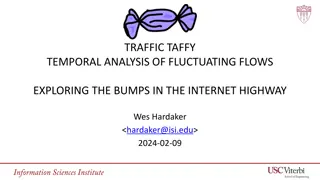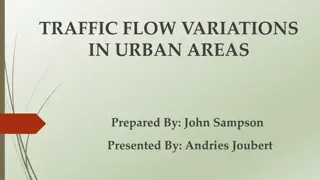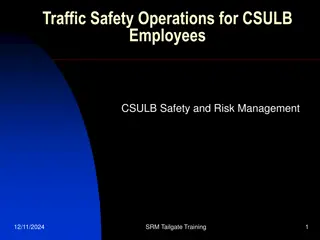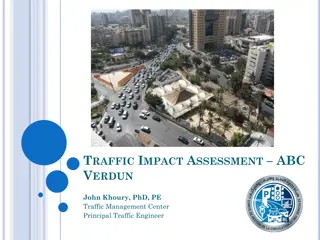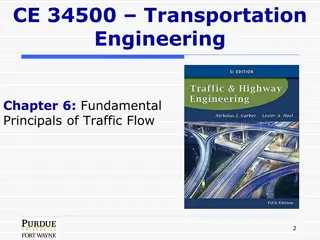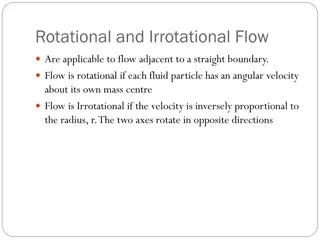Understanding Traffic Turning Tendency Surveys in Transportation Studies
Transportation surveys are crucial for gathering data on traffic movements and factors influencing them. Traffic turning tendency, traffic counts, and flow characteristics help planners assess road efficiency and safety. Monitoring traffic volumes and patterns aids in optimizing road infrastructure
0 views • 16 slides
Prioritizing Effective Traffic Management at the Workplace
Addressing the importance of traffic management as a top priority issue, the session aims to engage workers in assessing current practices, enhancing traffic management strategies, and improving safety measures to prevent incidents. The discussion focuses on key principles of controlling traffic ris
2 views • 12 slides
Principles of Traffic Demand Analysis and Highway Demand Forecasting
Understanding traffic flows is crucial in designing highways and managing traffic effectively. Traffic demand analysis involves forecasting future traffic volumes, modeling demand, and determining the necessary infrastructure improvements. This analysis helps in estimating axle loadings, pavement th
0 views • 36 slides
The Psychology of Flow: Achieving Total Focus and Optimal Performance
Engage in activities for their intrinsic value, where the ego diminishes, and time seems to vanish - that's when flow occurs. This optimal psychological state involves deep concentration, clear goals, and a sense of control. By embracing challenges and staying in the present moment, one can cultivat
0 views • 13 slides
Understanding Runoff in Hydrology
Runoff in hydrology refers to surface water flow from precipitation and other sources in drainage basins. It plays a crucial role in stream flow and peak flood formation, influenced by factors like overland flow, interflow, and groundwater flow. This article explores the sources of runoff, including
3 views • 27 slides
Road Traffic Signs and Markings Overview
Understanding road traffic signs and markings is crucial for safe driving. From Give Way signs to double solid lines, each element serves a specific purpose to regulate traffic flow and ensure road safety. This comprehensive guide breaks down the meaning and importance of various road markings such
0 views • 15 slides
Understanding Max Flow in Network Theory
In network theory, understanding the concept of maximum flow is crucial. From finding paths to pushing flow along edges, every step contributes to maximizing the flow from a source to a target in the graph. The process involves determining capacities, creating flows, and calculating the net flow ent
2 views • 41 slides
Fire Flow Requirements and Calculation Methods
Detailed information on site fire flow and hydrant flow testing requirements, how to calculate required fire flow, applicable codes and standards including NFPA and IBC, duration of fire flow, methodologies for fire flow calculation, and ISO methods and formulas.
4 views • 30 slides
IEEE 802.11-21/1115r0 Traffic Prioritization Summary
The presentation discusses traffic prioritization rules during restricted TWT SPs in IEEE 802.11-21/1115r0. It revisits the topic to address pending items related to traffic restriction or prioritization, including specific rules for APs, scheduled STAs, supporting non-AP STAs, and non-rTWT STAs. Co
1 views • 14 slides
Importance of Cash Flow Analysis in Financial Management
Cash flow analysis is a crucial financial tool for effective cash management, aiding in evaluating financial policies and positions. It helps in planning, coordinating financial operations, assessing cash needs, and meeting obligations. However, it has limitations as it does not substitute the incom
1 views • 7 slides
Effective Traffic Flow Management Strategies at Gate 1
This comprehensive plan outlines strategies for improving traffic flow at Gate 1 during peak hours, including implementing one-way traffic flows, alternative routes, and time adjustments. The plan addresses challenges during morning and afternoon peak hours, along with specific restrictions and solu
0 views • 7 slides
Traffic Volume Counting Methods and Analysis in Civil Engineering
Traffic volume counting in civil engineering involves various methods like traffic flow maps, intersection summary sheets, time-based direction charts, and summary tables. The collected data helps in analyzing peak periods, special events impact, and determining road capacity based on vehicle classe
0 views • 18 slides
Traffic Flow Improvement at Gate 1 Pilot Project Overview
The Traffic Flow Improvement project at Gate 1 aims to address congestion and safety issues by implementing a one-way traffic flow during peak times. The project involves rerouting traffic, creating designated lanes, and regulating access to optimize traffic movement and reduce the risk of accidents
0 views • 7 slides
Understanding Flow Monitoring in OVS for Efficient Network Management
Learn how Flow Monitoring in Open vSwitch (OVS) allows controllers to track and manage changes to flow tables, enabling efficient network management. Explore topics such as Flow Mod programming, Flow Monitor messages, OVS support, monitoring vs. snoop, and practical examples of flow monitoring in ac
0 views • 9 slides
Understanding Programmable Traffic Management for Network Optimization
Programmable Traffic Management involves packet scheduling, traffic shaping, policing, drop policies, packet buffering, replication, and classification to optimize network performance. It is used in integrated switch architectures and is crucial for addressing diverse traffic characteristics and req
0 views • 66 slides
Luxury Big Island SEO Report - February 2017 Summary
Sessions to the luxury Big Island website decreased by 21% in February 2017, but organic traffic saw an 11% increase attributed to a rise in total organic keywords. Top referrers for the past 6 months indicate Google and direct links drive the majority of traffic. The trend continued in February, wi
0 views • 13 slides
Kingwood Traffic Signals Overview and Updates
Traffic operations in Kingwood, managed by Johana E. Clark, P.E., include signal system improvements and updates. Recent changes involve signal removal studies, new signal installations, and upgrades at key intersections to enhance traffic flow and safety. The system's capacity and daily traffic vol
1 views • 11 slides
Understanding Traffic Response to Tolling: Insights from Research
Exploring how traffic reacts to road user charging, this study investigates the impact of tolling on traffic flow and revenue. With a focus on price elasticity and traffic modeling, the research examines the complexities of toll implementation and its effects on congestion and infrastructure needs.
0 views • 13 slides
Understanding Flow Chemistry for Efficient Chemical Reactions
Flow chemistry, also known as continuous flow or plug flow chemistry, revolutionizes chemical reactions by running them in a continuous flow stream. This dynamic process offers efficient manufacturing of chemical products with precise control over critical parameters like stoichiometry, mixing, temp
2 views • 7 slides
Preventing Road Traffic Injuries: A Global Perspective
Road traffic injuries are a significant global issue, causing millions of deaths and injuries annually. This report highlights the complexity and dangers of road traffic systems, emphasizing the need for increased awareness and preventive measures at governmental, industrial, and individual levels.
1 views • 27 slides
Understanding Open Channel Flow and Mannings Equation
This review covers hydraulic devices such as orifices, weirs, sluice gates, siphons, and outlets for detention structures. It focuses on open channel flow, including uniform flow and varied flow, and explains how to use Mannings equation for calculations related to water depth, flow area, and veloci
1 views • 43 slides
Engaging Traffic Education Lesson for Students at Shaistagonj Kamil Madrasah
The introduction of Mr. Ariful Islam, a dedicated English lecturer at Shaistagonj Kamil Madrasah in Hobigonj, sets the stage for an interactive lesson on Traffic Education. With a focus on Dhaka city's traffic conditions, the lesson aims to help students identify traffic rules, cross roads carefully
0 views • 26 slides
Understanding the Role of NCUTCD in Traffic Control Management
The National Committee on Uniform Traffic Control Devices (NCUTCD) plays a crucial role in setting standards and guidelines for traffic control devices. Established in 1980, it advises the Federal Highway Administration (FHWA) on the Manual on Uniform Traffic Control Devices (MUTCD), facilitating re
0 views • 34 slides
Understanding Fanno and Rayleigh Lines in Adiabatic Flow
Fanno and Rayleigh lines on the h-s diagram help in analyzing adiabatic flow with friction effects. The Fanno line represents frictional flow, while the Rayleigh line signifies non-adiabatic, frictionless flow. These lines aid in plotting flow properties and understanding phenomena like shock waves
0 views • 6 slides
Enhancing IEEE 802.11 for Traffic Information Exchange
Proposal to enable non-AP STAs or non-AP MLDs to request traffic information from APs or AP MLDs, aiming to improve traffic detection accuracy by providing essential details like timing information and traffic flow characteristics. The proposal introduces a new IE called TSPEC request to facilitate
0 views • 6 slides
Efficient Traffic Monitoring for Science DMZ with Side-Channel Traffic Winnowing
This study explores efficient traffic monitoring for Science DMZ using side-channel based traffic winnowing. It introduces a lightweight detection system to address the limitations of traditional high-performance data transfer methods. The proposed approach enhances security policies, improves netwo
0 views • 35 slides
Understanding Traffic Engineering Studies in Civil Engineering
Traffic engineering is a crucial aspect of transportation engineering that encompasses planning, design, and operation of roads, streets, and highways. It involves analyzing traffic volume, speed studies, parking patterns, traffic flow characteristics, accident studies, and more. Traffic volume stud
0 views • 37 slides
PhD in Telematics Engineering: Traffic Prediction with Big Data Technologies
This PhD study focuses on traffic prediction using Big Data technologies within Software-Defined Networking (SDN). It explores the separation of data and control planes in SDN architectures, emphasizing the benefits of centralized control for network operations. Additionally, the study delves into t
0 views • 33 slides
Machine Learning Practices in Network Traffic Across Data Centers
This presentation focuses on machine learning practices in managing network traffic across data centers. It covers topics such as context and challenge definitions, machine learning approaches, unexpected traffic scenarios, major contributors, resource planning, and problem definitions related to tr
0 views • 18 slides
Multi-AP Coordination for Low Latency Traffic Transmission
The document discusses the integration of multi-access point (AP) coordination to enhance the transmission of low-latency traffic in wireless networks. It addresses the challenges and introduces modes of operation capable of reducing latency and improving reliability for low-latency (LL) traffic tra
0 views • 9 slides
Understanding Traffic Flow Elements in Transportation Engineering
Explore the fundamental principles of traffic flow, including primary elements like flow, density, speed, and headway. Learn about time mean speed (TMS) and space mean speed (SMS), as well as concepts such as time and space headway. Discover how these elements contribute to modeling traffic flow and
0 views • 16 slides
Understanding Traffic Signal Warrants and Timing Relationships
Explore the world of traffic signal warrants, basic terminology, and timing relationships with detailed visuals and explanations. Learn about lost time, green indications, effective green time, and flow terminology. Discover concepts like the Change/Clearance Interval and the Dilemma Zone in traffic
0 views • 17 slides
Understanding Traffic Education: A Lesson on Traffic Jams and Solutions
Join Mr. Ariful Islam in his English class for Alim 1st year students as he introduces the topic of Traffic Education. Through warm-up activities and reading Michael Hobbes' article on traffic challenges in Dhaka, Bangladesh, students explore the causes of traffic jams and envision solutions to impr
1 views • 23 slides
Exploring Traffic Anomalies with Traffic Taffy: Network Operators' Challenges
Discover how network operators tackle odd anomalies in internet traffic with Traffic Taffy, a tool that aids in temporal analysis of fluctuating flows. Current solutions and specific problem spaces are discussed, alongside insights for comparing anomalies against baselines and defining the problem s
0 views • 24 slides
Traffic Routing and Game Theory in Network Design
Explore the intersection of traffic routing and game theory in network design scenarios. Delve into concepts like Atomic Congestion Games, Potential Function, Price of Anarchy and Stability, Nash Equilibrium, Braess's Paradox, and the pursuit of Pure Strategy Nash Equilibriums in traffic routing gam
0 views • 16 slides
Traffic Flow Variations in Urban Areas: A Comparative Study Between 1980 and 2015
This study compares the traffic flow variations in urban areas, focusing on average daily traffic totals, daily traffic volumes, and monthly variations between the years 1980 and 2015 in Johannesburg. Data collection locations, including traffic data from different sites and lanes, are presented alo
0 views • 20 slides
CSULB Traffic Safety Operations Tailgate Training
Overview of CSULB Safety and Risk Management's training on traffic safety operations for employees, focusing on highway work zone accidents, traffic control, equipment operation, TTC plans, high visibility clothing, and vocabulary related to traffic control. Discusses DOT street type definitions, re
0 views • 15 slides
Traffic Impact Assessment for ABC Verdun Project
The Traffic Impact Assessment for the ABC Verdun project, led by John Khoury, PhD, PE, provides detailed analysis on traffic counts, scenarios, intersection conditions, microsimulation results, and recommendations for a mega-scale mall opening in the area. The assessment includes traffic data collec
0 views • 10 slides
Understanding Traffic Flow Theory and Shock Waves in Transportation Engineering
Explore fundamental principles of traffic flow, applications of traffic flow theory, shock waves in traffic streams, and types of shock waves in transportation engineering. Learn about determining lane lengths, estimating delays, and analyzing shock wave behaviors in various traffic scenarios. Delve
0 views • 18 slides
Understanding Fluid Flow and Measurement Devices
The concept of rotational and irrotational flow adjacent to a straight boundary, along with the dynamics of fluid flows and laws governing fluid flow like the continuity equation and energy equation, are discussed. Insights into devices for flow measurement such as venturimeter, pitot tube, orifices
0 views • 4 slides
